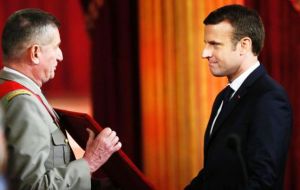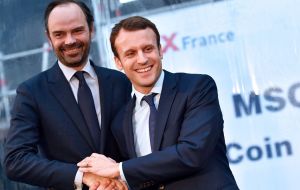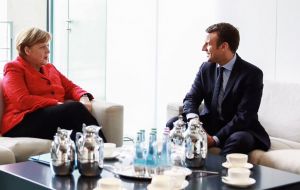MercoPress. South Atlantic News Agency
President Macron vows a French renaissance, and travels to meet Merkel in Berlin
 The 39-year-old former investment banker and economy minister was inaugurated on Sunday in a ceremony at the Élysée
The 39-year-old former investment banker and economy minister was inaugurated on Sunday in a ceremony at the Élysée  The president has kept his choice of prime minister a closely guarded secret, but in Paris the candidate most hotly tipped is Édouard Philippe, the mayor of Le Havre
The president has kept his choice of prime minister a closely guarded secret, but in Paris the candidate most hotly tipped is Édouard Philippe, the mayor of Le Havre  President Macron having strong pro-EU views and in his visit to meet Merkel he is expected to push for Euro reform: a common budget and its own finance minister
President Macron having strong pro-EU views and in his visit to meet Merkel he is expected to push for Euro reform: a common budget and its own finance minister Emmanuel Macron is beginning his first day as French president with two main tasks, picking a prime minster, a crucial appointment since he needs to make a good showing in next month's parliamentary elections to push through his planned economic reforms. The second is to travel to Germany to meet Chancellor Angela Merkel.
The 39-year-old former investment banker and economy minister was inaugurated on Sunday in a ceremony at the Élysée Palace. In his brief speech he promised to convince people that “the power of France is not declining - that we are on the brink of a great renaissance”.
He vowed that his presidency would “give the French back the confidence to believe in themselves” and promised to see the EU “reformed and re-launched” during his time in office.
The president has kept his choice of prime minister a closely guarded secret, but in Paris the candidate most hotly tipped is Édouard Philippe, the mayor of Le Havre. He is not a member of the president's new party - La République En Marche - but of the centre-right Republican.
The visit to Angela Merkel is expected to be a cordial one, with President Macron having strong pro-EU views. He has said he wants to reform the Euro zone, giving it a common budget and its own finance minister, but he will need German backing.
For its part, Germany wants to see France carry out structural changes such as reducing public spending and reforming its rigid labor market.
Macron has promised such reforms as he tries to revive the economy and reduce unemployment, but to realize them his party will need a majority in parliament. République en Marche recently unveiled more than 400 candidates for June's elections. Many have never held elected office before.
The former banker and finance minister was sworn-in as president a week after his victory over the National Front's Marine le Pen, with 66% of the vote in the run-off poll. He had never contested an election before and only formed his centrist movement a year ago. Macron is France's youngest leader since Napoleon and the first to be born after 1958, when a presidential system was set up.
Tight security was in place across Paris for the ceremony at the president's official residence, with hundreds of extra police on patrol. France has been under a state of emergency since terror attacks in 2015 and a large section of the city centre was closed to traffic all morning.
Speaking later during a visit to the capital's town hall, President Macron praised the way Parisians had responded to terror attacks. He said that rather than hide behind barricades, many had opened their doors and offered help “because the face of Paris is the face of France, that of a living fraternity”.
He also promised to strongly support the city's bid to host the 2024 Olympic Games.
Before the Sunday inauguration ceremony began, he spent nearly an hour with his predecessor, who handed him the country's nuclear codes. It was Mr Hollande who launched the new president's political career, appointing him first as adviser and later economy minister.
Mr Macron faces major challenges including high unemployment, especially among France's young, and low growth. He says his main aims are to boost investment and to set up a “new growth model” that increases social mobility and helps the environment.




Top Comments
Disclaimer & comment rulesCommenting for this story is now closed.
If you have a Facebook account, become a fan and comment on our Facebook Page!